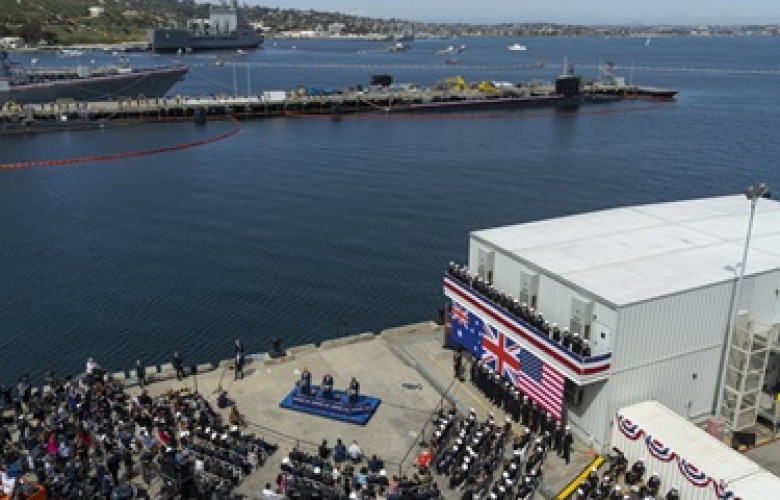Why New Zealand should not join AUKUS Pillar II
Oliver Sinclair is a practising lawyer and is studying a Masters of International Relations at the Australian National University. He holds a Bachelor of Arts (Honours) and a Bachelor of Laws
2025-02-18
NEW ZEALAND
DEFENCE AND SECURITY
This article first appeared on The Interpreter, published by the Lowy Institute

In February 2024, New Zealand’s national government explored an interest in joining AUKUS Pillar II, the strand of the Australia–UK–US security partnership responsible for the sharing of advanced technologies such as quantum computing, artificial intelligence and hypersonic weapons. A confidential Ministry of Foreign Affairs and Trade briefing paper suggested AUKUS contained “opportunities” for New Zealand’s defence industry and that it “aligns with New Zealand’s strategic policy settings … across multiple fronts”. The decision to join AUKUS seems close to foregone, with New Zealand’s Foreign Minister Winston Peters citing “powerful reasons” to do so.
The reaction to Peters’ comments and the possibility of New Zealand joining AUKUS has been swift and polemic. Critics argue joining AUKUS would represent a “seismic shift” in New Zealand’s long-held independent foreign policy, dragging the country into a view of the Indo-Pacific that is based on maintaining US military primacy and containing China. They also suggest AUKUS membership would damage New Zealand’s distinctive worldview as a Pacific nation and its commitments as a non-nuclear state. Advocates view the deal as an opportunity to increase defence interoperability, future-proof alliances and strengthen the regional defence architecture that contributes to regional stability.
New Zealand should not join AUKUS. But not for any of these reasons.
New Zealand is a country that navigates an identity between settler colony and indigenous legacy. It is this marriage of two identities that has bled through to domestic and foreign policies, giving New Zealand a “unique and intimate understanding” of the Pacific that “positions [it] on cultural grounds to be a strategic diplomatic actor in the Pacific”.
In an address titled “Pacific Futures”, Winston Peters stressed New Zealand’s connections to the Pacific were “linked by history, culture, politics, demographics and DNA”. New Zealand’s indigenous Māori have Pacific heritage, and the country has a large Pasifika community. More than a quarter of the population are of Pacific descent. Demographics aside, New Zealand has charted a course in its governance that blends its Western history and Pacific realities. Its policies have continually challenged the norms of governance in a post-colonial society and sought to propel Māori culture, reaching a high-water mark in 2021 with an indigenous foreign policy. While that and other policies have been wound back, a wider lens shows that New Zealand’s efforts at integrating settler and indigenous cultures have been world-defining. That is painfully obvious when laid next to partner Australia or native Hawaiians.
Joining AUKUS would represent a turning from New Zealand’s Pacific identity and an embrace of traditional partners in the Anglosphere, Australia, the United Kingdom and the United States. An alignment with AUKUS would be a tacit endorsement of a US-led strategic vision of the region and one that goes against Pacific principles of “peace [and] harmony” and aspirations for “demilitarisation”. It would demonstrate that New Zealand is not committed to a full embrace of Pacific regionalism that is Pacific-focused and Pacific-led.
Not joining AUKUS need not mean New Zealand abandons its strategic and security interests. New Zealand recognises the “sharpening geostrategic dynamics” in the Pacific and its need for national security as part of its foreign policy. But rather than signing up to AUKUS and attaching itself to Anglo powers, New Zealand is better served by remaining committed to its role as a “trusted bridge builder” in the Pacific. New Zealand holds significant sway within the Pacific, being recognised as a trusted partner due to its embedded Pacific voices. This modern cultural blend is New Zealand’s point of difference and one that other states jostling for influence can neither replicate nor buy. It should not be relinquished lightly.
The importance of New Zealand’s Pacific identity to its regional influence is shown in several Pacific perspectives studies, which illustrate unequivocally that New Zealand is a trusted partner, and excels above larger players in the region due to the visibility of its Pacific heritage. One study conducted in Solomon Islands, Vanuatu and Fiji found that “New Zealand is held as an equally important partner as Australia … [due to] having a much stronger understanding of, and track record of protecting indigenous rights”. New Zealand was “singled out as the country most inclusive of Pacific islanders” across all countries. And Solomon Islanders said New Zealand had a deeper influence in the region due to the “stronger position of Māori and Pasifika cultural values in official NZ policies and the visibility of leaders from those communities”.
Other studies in Tonga show 63 per cent of Tongans trust New Zealand the most as a partner, above Australia, the United States and China. In Samoa, New Zealand was cited as the Western country with the “most influence” at 40 per cent, and 95 per cent of Samoan respondents said New Zealand’s influence was positive.
New Zealand holds a level of influence and trust throughout the Pacific that is both significant and outsized. Its influence is often paired with its visibility and support of indigenous and Pacific voices. Joining AUKUS would signal a suppression of those voices and risks relinquishing New Zealand’s defining geopolitical feature. New Zealand can still prosecute its strategic and security interests, but would be far more effective doing so from a position of influence within the Pacific.
Membership
NZIIA membership is open to anyone interested in understanding the importance of global affairs to the political and economic well-being of New Zealand.